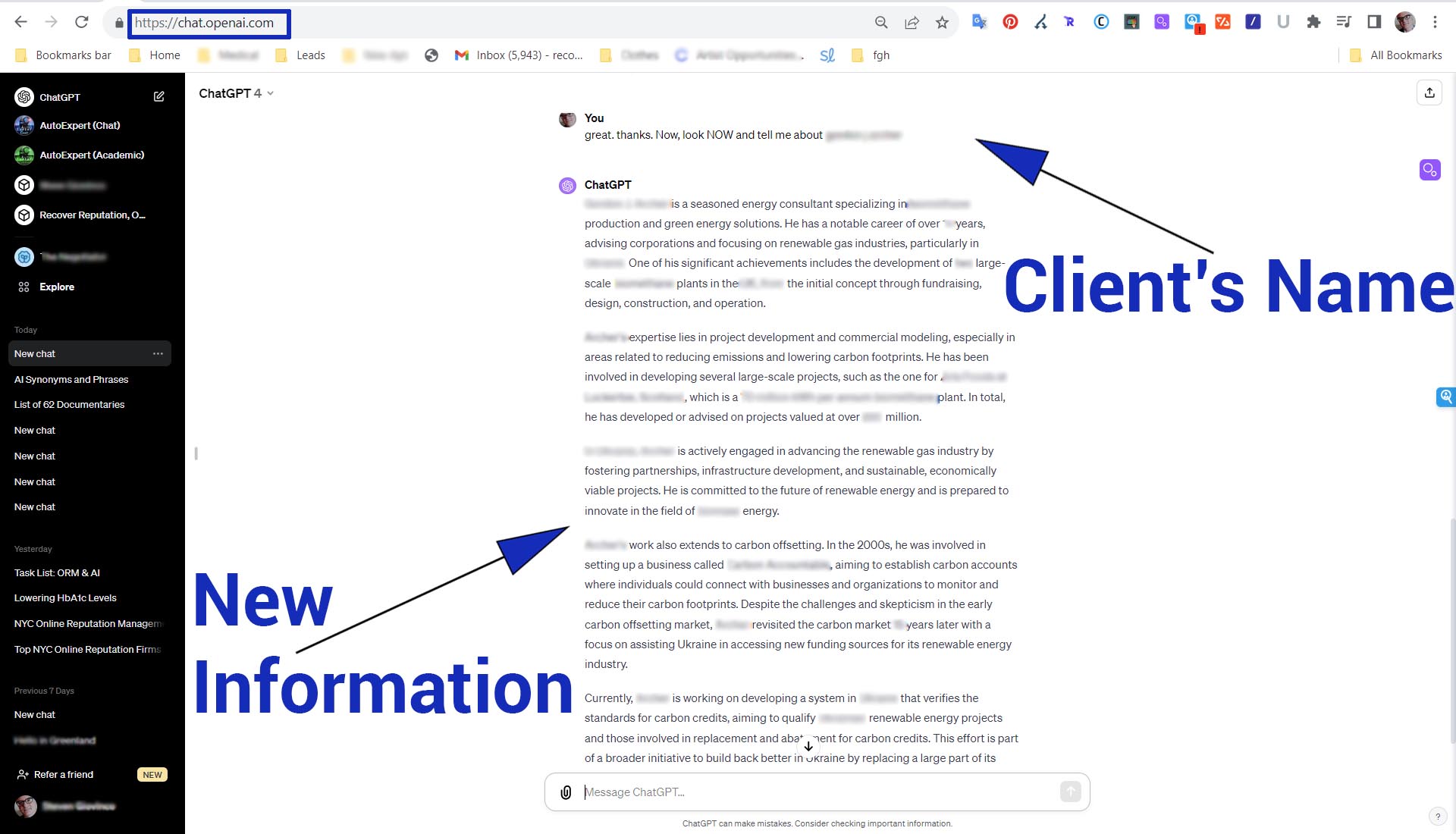Last Updated on October 3, 2023 by Steven W. Giovinco
Tinder and 4 Ways it Can Ruin Your Online Reputation
Why Your Dating App Profile Matters More Than You Think
Introduction: The Unintended Repercussions of Swiping Right
Dating apps like Tinder, while providing an avenue for connection, come with risks (beside scams) that aren’t immediately obvious. One of those? The potential dent in your online reputation.
A former client of mine learned this the hard way. An old business adversary unearthed his Tinder profile and used its content to craft a damaging narrative, resulting in tarnished business relationships and a messy personal online trail.
Navigating the vast landscape of Tinder seems innocent enough. Yet, beneath those fleeting swipes lurks a real threat: the potential misuse of your shared images and information.
Understanding Tinder’s Potential Pitfalls
Tinder, like many modern dating apps, can feel like a tightrope walk between discovering potential matches and safeguarding your online reputation.
The explosively popular dating app gained popularity—or notoriety–way back during the 2014 Winter Olympic by making it an easily visual quick way to connect with people. The primary usage is for casual online dating for adults.
Basically, you see an image of someone in your area pop up on the screen. If you don’t like them, swipe left; if you think they are interesting, swipe right. If you both swipe right, you get connected, and you can text each other and take it from there; if either one swipes left, you will never see them again. This approach is cleverly unique, because there are no hoards of “spam” messages from people that like you but you don’t fancy.
The app has a reputation as a “hookup” app, which is sometimes well deserved, but it is used for face to face dating as well, depending on the age group using it. It has made millions of connections, and its popularity is increasing exponentially, and because of it, some are even using it for business networking.
While Tinder’s streamlined, visual, and (mostly) anonymous interactions make it a popular choice, its integration with Facebook data can have unintended reputation repercussions. Sure, it offers users a simple choice based on profile impressions where mutual interests spark a connection. But this simplicity conceals potential online reputation pitfalls, especially considering its use of Facebook data.
What could go wrong?
Well, plenty. It could really impact someone’s online reputation in several ways. First, let’s look more closely at the dynamics involved, starting with some definitions.
Defining Online Reputation Management
But what is online reputation management? It involves everything about you or your business that appears online, primarily dealing with search results. With apps like Tinder, ORM becomes crucial since it gathers Facebook details, sometimes revealing more than intended. Basically, if something negative appears in the first or second page of Google, it’s a massive problem.
The Facebook Connection
Now let’s understand the Tinder/Facebook symbiotic connection. One of the advantages to Tinder is its ease of use and its quick setup. No need to answer dozens of questions or enter extensive biographical information: it’s all there, minimal as it is, from Facebook, which is required for usage. Conveniently, it brings in text and images, making setup a breeze.
However, there are challenges many might not be aware of.
Four Tinder Traps for Your Online Reputation
1. Biographical Leakage from Facebook
The convenience of Facebook integration comes with a price. Personal information, from websites to photos, might unintentionally be exposed on Tinder, making identification easier.
Often the text about you on Facebook is (very) personal and probably is only intended for friends or family. Some of this information could include:
- Websites–business, personal or both
- Other links that mention you, such as journals or articles
- YouTube channels or videos of you
- Twitter, Instagram, and other social media platform addresses
- Business or job postings
- An upcoming appointment
- Even home phone numbers
This all makes it extremely easy to identify you, the Tinder user.
2. Photo Exposure
Tinder auto-fetches images from your Facebook’s public folder. However, recognizable photos can compromise your anonymity and potentially expose others.
A handful of Images are pulled directly from Facebook. Although this makes setup easy as mentioned above, it could leave the user open to problems. Having clearly identifiable images can break your anonymity. Also, images with other people could expose them to reputation problems.
3. Shared Connections
Tinder showcases mutual Facebook friends, enhancing trust. However, this very feature can betray your anonymity. Someone determined enough could sift through mutual connections to identify you.
4. Group Revelations
Tinder displays mutual Facebook groups, which, though seemingly benign, might disclose more about your interests or affiliations than you’d prefer.
These can be a challenge because someone could see the Groups and look through them to identify the user. Also, the Tinder user might not want others to see what group they are part of.
Ready to Regain Control of Your Online Reputation?
Get in touch with us today for a free consultation. Let's work together to restore your online reputation and get your life back on track.
Learn More
Testimonials and real before-and-after screenshots of actual Recover Reputation clients.
Four Ways Tinder Can Undermine Your Reputation
“Trolls” with a little ingenuity can cause real damage. Biographical text, photos and just being on Tinder might be used to paint an unsavory online web presence.
This could include:
- Disgruntled ex-business associates
- Recently fired employees
- Unscrupulous competitors wishing to gain and unfair advantage
- A date “gone wrong”
- Or anyone with an ax to grind could exploit this by taking personal information and engaging in an Internet smear campaign.
Here’s how:
1. Doxing or Home Location Exposure
Revealing your neighborhood, street or even home is possible (“doxing” is just that-realvealing where you live to others) unintentionally through Facebook sourced Tinder photos. Having your home location revealed online is never a good thing.
Also, a Facebook “Friend” or follower can see who they have in common and just search through their list of connections for the first name listed on the profile. Especially armed with a photo of the person, this can make identification very easy.
2. Business Exposure
Similarly, profile photos or descriptive text can uncover your workplace. This can leave you susceptible to forms of harassment where untrue negative reviews might be created or damaging articles are written. Ultimately, this can result in lost business and income.
3. Shattered Anonymity
What’s meant to be a private Tinder experience can be de-anonymized through mutual friends, groups, or interests. As mentioned, private details about you, with a little detective work, can be uncovered if the ‘troll’ is motivated enough.
4. Misinterpretation of Intent
Finally, some with an ax to grind could misconstrue an intention of meeting new people or making new business connections on Tinder as seeking casual encounters. If information like this comes out online, it could result in ruined deals or broken personal relationships.
Safeguarding Your Reputation on Tinder
How to protect yourself? Here are some ways to minimize potential pitfalls using Tinder.
1. Bio Revamp
Modify your imported Tinder bio to exclude external websites or identifying details. Keep descriptions generic. Remove anything and everything that has external websites or other links to elsewhere and replace it with a general description about yourself.
2. Curate Images
Choose Facebook images for Tinder carefully. Avoid identifiable backgrounds or compromising situations. Selectively add images that show only part of your and not your face, don’t show anyone else, and avoid including specific details about the location.
3. Shared Connections
Tinder showcases mutual Facebook friends, enhancing trust. However, this feature can betray your anonymity. Someone determined enough could sift through mutual friends to identify you. The best way to protect your online reputation is to share little or no personal information on the web. I know Tinder is about connecting with others, but avoid including details and be mindful of mutual Friends, Groups or common Interests.
4. Group Revelations
Tinder displays mutual Facebook groups, which, though seemingly benign, might disclose more about your interests or affiliations than you’d prefer.
What To Do If Your Reputation Is Damaged?
Sometimes, these solutions might not be enough if the damage is severe. If negative links appear on the first page of Google search results, it might be possible to remove some of the posts, but most likely, they will need to be suppressed down off the first or second page to dampen the damage. This usually can take months or more of work.
Understanding Your Digital Footprint:
- Complete a thorough review of search engine results, social media mentions, blogs, forums, and other digital spaces where your name or business appears. It’s a digital version of a health check-up.
Strategizing a Game Plan:
- With a clear view of your current online reputation, lay out a tailored roadmap to repair any damage and enhance your digital image.
Content Creation and Promotion:
- Content is key. Craft high-quality, positive content about you or your business and strategically place it in spaces where it’s most effective. This can range from insightful blog posts, engaging social media updates, to compelling images or videos. It’s about telling your genuine story in the best light.
Ongoing Monitoring and Adaptation:
- The digital world is dynamic, and so work doesn’t just stop. It’s necessary to continuously monitor your online reputation, ensuring that all the positive content remains at the forefront. If new challenges arise, it’s necessary to adapt and address them quickly, ensuring you always put your best foot forward online.
Bottom Line
There will always be new social media apps or sites that come in fashion, but with them come new and everchanging online reputation management challenges. Be authentic, yes, but also be mindful that privacy mindfields abound. Having a strong online presence–at all times–can help mitigate against and future problems..
If you have any questions about Tinder or your online reputation, feel free to reach out to me, Steven W. Giovinco, or Recover Reputation.




1 thought on “Beware: How Tinder Can Impact Your Online Reputation”
Tinder sometimes can be tricky, and impact your online reputation